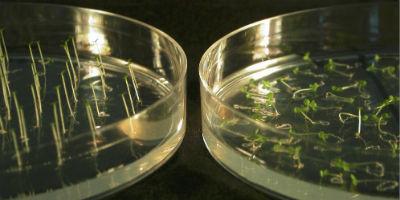Science Festival interview with Dr Neil Robertson
Dr Neil Robertson of the University’s School of Chemistry explored the latest developments in solar technology, and how we might learn lessons from plants in harnessing the power of the sun.
The event, 'Catching the Rainbow: plants, people and solar cells in Scotland', took place at 5.30pm on 13 April at Summerhall.

What can people coming along to your event expect?
The talk will present different ways in which plants use light, not only to capture its energy but also to sense their surroundings and control their growth.
The focus will be on different parts of the colour spectrum and how plants use these selectively to sense their surroundings. Following this, we will discuss how society is increasingly using sunlight to generate electrical energy through photovoltaic panels. Again, we will consider the light spectrum and how scientists can capture and control light of different colours and what this means for our energy future.
The talk will be illustrated by demonstrations, and a hands-on session at the end will allow the audience to chat to the science teams involved and try out some things for themselves.
What do you hope audiences can get out of coming along?
The audience should get some insight into the latest technologies for using sunlight as well as some historical and scientific perspective on the background and context. Most importantly, it should be fun.
What do you think is the value of inviting the public to interact with scientific objects?
Everyone is a scientist, whether they practice professionally or not. We all enjoy trying out new objects to see what they do and learn how they work.
Why is taking part in the science festival important to you?
The science festival is the ideal chance to link the activities in the University with the wider Edinburgh and Scottish communities.
The research done in academia and associated companies directs the future of our lives, and equally the motivations and support of society drives the scientific process.
What impact does your day-to-day work have on society?
We work on technologies that can radically change our lives in the longer term. Energy will be the defining challenge of this century, and it is arguably the most important issue ever to face humanity.
Progress in all aspects of renewable energy is essential and our work on emerging photovoltaic technologies fits directly into that challenge.
What do you get out of engaging with the public?
As well as informing the public of the ongoing work to meet our energy challenges and hopefully inspiring young people to get involved with science, there is also a huge personal benefit.
To discuss our work with the public, I first have to clarify the key points in my own head and I have to respond to important questions and observations that come from the fresh perspective of a public audience. This helps to sharpen and refine the scientific process.

